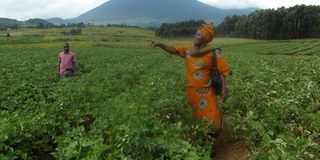Why shortage of seed potato is an investment opportunity

A seed potato farmer in her field in Kisoro. The shortfall in potato for value addition is an opportunity for such farmers as well as those who are looking to invest in agriculture. FILE PHOTO
What you need to know:
- Uganda has a shortfall in seed potato production, an EPRC study by Swaibu Mbowa and Francis Mwesigye shows.
Potato production in Uganda is constrained by lack of inputs namely fertilisers, pesticides and clean seed amongst others.
Most potato producers in Kigezi region are subsistence farmers characterised by poor farming methods, which include use of poor quality inputs. For example, over 90 per cent use poor quality recycled seeds. This leads to low productivity and yields of four to seven tons per hectare, which is 60-80 per cent lower than the 21 tonnes per hectare estimated potential.
While farmers have access to a range of improved potato varieties (like Rutuku, Victoria and Kachport1) intensification is constrained by the numbers of organised and certified foundation seed producers.
Inadequate quantities
It is estimated that the country requires about 25,400 metric tonnes—worth $8.2m—of certified quality seed per annum. However, an unexploited gap of about 17,000 metric ton—worth $5.6m—of seed potato production annually remains due to limited capability in the seed potato supply chain.
The second dimension of constraints to seed potato supply chain relates to potato varieties the seed system produces.
Not enough seed
During the main season, the Kachwekano Zonal Agricultural Research Development Institute (Kazardi) produces about 364 80-kg bags of certified basic seed in different varieties: Victoria, Kachpot1, Rwangume, Kinigi and Rutuku.
This production pattern responds to the attributes of potato preferred by producers: fast maturing; highly demanded; disease resistant; availability of basic seed; and high yielding.
The production pattern at Kazardi mirrors that followed by the private seed multipliers.
This reinforces the view that capabilities and priorities of Kazardi for producing basic seed potato varieties are interlinked with those of private seed multipliers.
Value addition is constrained by unreliable supply of potato seeds of varieties (like Kachpot 1) suitable in processing of potato into crisps.
Figures show that both Kazardi and private seed multipliers produce more of varieties like Rwangume, Kinigi, and Victoria that tend to match the preference criteria. While seed for Kachport1, a highly demanded variety for processing, is not adequately produced.
In this regard, there is a perpetual shortage in the supply of seed potato suitable for processing.
Preference for Kachpot 1 is explained by its high dry matter content and the smooth red skin, which is suitable for making of crisps.
Some industries such as those owned by Uganda Industries Research Institute (UIRI) process potatoes into quality crisps branded ‘EMONDI’.
However, inadequate and unreliable supply of Kachpot1 potato variety was cited as a major constraint to the value addition business operations of UIRI.
Varieties such as Victoria are not suitable for processing crisps because it has low dry matter and have “deep eyes” that leads to wastage on peeling.
Other varieties like Kinigi are unsuitable for industrial level processing.
However, the crisp produced using Kinigi are of poor quality due to ‘blemish rings colouring’.
To note
One of the major challenges slowing down increased productivity in the potato sub-sector is partly due to limited supply in seed for
propagation. The shortfall in supply of improved seed is estimated to be 17,000 metric tonnes- valued at Shs18b in the country. This challenge can be an investment opportunity because seed potato production is a profitable venture with relatively high profit margins.
Expert’s notes
The gap
It is estimated that the country
needs to produce about 25,400 metric tons of quality seed worth Shs28b ($8.2m)




